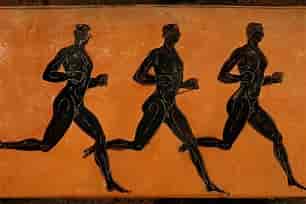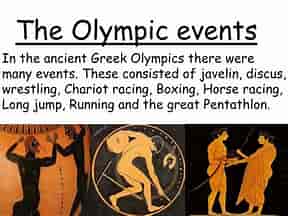The History of Sports
Sports are an integral part of human culture, providing entertainment, fostering competition, and bringing people together across the globe. But where did it all begin? The history of sports is a fascinating journey that stretches back to ancient civilizations and spans millennia of evolution. In this article, we will explore the evolution of sports from the grandeur of Ancient Greece’s Olympic Games to the modern-day global sporting events we enjoy today. Let’s take a deep dive into the past and uncover the rich history of sports that have shaped the world of athletics as we know it.

Introduction: The Birth of Sports and Their Cultural Significance
The love of sports is not something new. In fact, the origins of organized athletic competition can be traced back thousands of years to Ancient civilizations. Over time, sports became more than just a means of physical activity—they evolved into monumental cultural events, social rituals, and platforms for national pride. From the ancient Olympic Games of Greece to the global sporting phenomena of today, the journey of sports is a reflection of human development, cultural exchange, and the ongoing pursuit of excellence.
But how did it all start? What is the true significance of sports in society? Let’s go back to where it all began, exploring the rich history and evolution of sports across different civilizations and eras.
The Origins of Sports: Ancient Civilizations
Ancient Egypt: Sports in the Early Dynasties
Long before the Olympic Games became the world’s most celebrated athletic competition, ancient Egyptians were also enthusiastic about physical activities. Evidence from murals and artifacts suggests that sports like wrestling, archery, and board games were part of Egyptian life, both for leisure and military training. These activities were not only forms of entertainment but also had symbolic importance in religious and social practices.
Mesopotamia: The First Organized Competitions
The Sumerians, Babylonians, and Assyrians in Mesopotamia also indulged in various physical contests. Racing, wrestling, and mock combat were among the earliest examples of organized sports. The ancient Mesopotamians even developed early versions of team games and ball sports, with some forms resembling early versions of football.

Ancient Greece: The Birth of the Olympics
The Rise of the Olympic Games
No discussion of the history of sports would be complete without mentioning the Ancient Greeks and the birth of the Olympic Games. The first Olympic Games were held in 776 BCE in Olympia, Greece, and they were dedicated to the Greek god Zeus. These Games became a central part of Greek culture and were held every four years. They consisted of a series of athletic contests, including running, wrestling, boxing, and chariot racing, all designed to showcase physical prowess and honor the gods.
The Olympics in ancient Greece were more than just a sporting event—they were a religious festival, a celebration of the human body’s beauty and strength, and a unifying force for the Greek city-states. Athletes competed for glory, fame, and the coveted olive wreath crown, which symbolized their victory.
Key Events and Sports in Ancient Greece
The most famous events at the original Olympics included the stade race (a short sprint), pentathlon (a combination of five events: running, jumping, discus, javelin, and wrestling), and pankration (a brutal mixture of boxing and wrestling). These events showcased the athletes’ versatility and stamina, and they were revered by both participants and spectators alike.
The Decline of the Ancient Olympics and the Dark Ages
The Fall of the Greek and Roman Empires
After centuries of popularity, the Olympic Games came to a halt in 393 CE, when Roman Emperor Theodosius I outlawed pagan festivals, including the Olympics. The fall of the Roman Empire and the onset of the Dark Ages in Europe led to a significant decline in the importance of organized sports. For many centuries, physical competition and public games were overshadowed by religious and political upheaval.
Medieval Sports and Recreation
While the Olympics were dormant, sport continued in some form throughout the Middle Ages. Knights and nobles engaged in jousting tournaments, archery contests, and falconry as forms of recreation and skill-building. For commoners, folk games, often with minimal rules, served as the basis for community bonding and competition.
The Revival of the Olympics: The Birth of Modern Sports
The Renaissance of Physical Competition
As Europe entered the Renaissance period, there was a renewed interest in humanism, physical fitness, and athleticism. This cultural shift laid the foundation for the revival of more organized sporting events. The 18th and 19th centuries saw the rise of new forms of sport, such as cricket in England and the creation of rugby and football.
The Founding of the Modern Olympic Games
The true revival of the Olympics, however, came in 1896, when Pierre de Coubertin, a French educator, founded the modern Olympic Games in Athens, Greece. Inspired by the ancient Greek tradition, de Coubertin’s vision was to create a global platform for athletic excellence and international unity. The first modern Olympics featured 13 countries and 43 events, marking the beginning of the global sporting spectacle we know today.
The Evolution of Modern Sports
The Emergence of Professional Sports
The late 19th and early 20th centuries saw the establishment of professional sports leagues in various countries. Baseball in the United States, football (soccer) in Europe, and rugby in England were among the first to transition from amateur to professional sports, with paid athletes and organized competitions. These developments led to the creation of major sporting events like the FIFA World Cup and the Super Bowl, which are now household names.
Globalization of Sports
The 20th century marked the era of globalization in sports. New technologies, mass media, and the advent of television broadcast helped sports reach a global audience. As a result, international competitions like the FIFA World Cup, the Olympic Games, and the Tour de France became global phenomena, with billions of fans tuning in from all corners of the world.
The Rise of Technology in Sports
In recent decades, technology has significantly impacted sports. From advanced training methods to sophisticated tracking systems, technology has improved performance, safety, and fan engagement. The introduction of video assistant referees (VAR) in soccer, wearable devices for tracking performance, and virtual reality for training are just a few examples of how technology continues to shape the modern sports landscape.
The Modern Olympics: A Global Spectacle
The Growth and Impact of the Modern Olympics
Today, the Olympics have grown into a global event that transcends borders, cultures, and politics. Held every four years, the Summer and Winter Games feature thousands of athletes from over 200 countries, competing in a wide range of events, from swimming and gymnastics to skiing and ice hockey. The Olympics are not just about sports—they symbolize international unity, friendship, and peace.
Over time, the Games have evolved to include new sports, such as basketball, skateboarding, and surfing, reflecting changing interests and emerging global sports trends. The Olympics also serve as a platform for athletes to make political statements and raise awareness for social causes, as seen in iconic moments like the Black Power salute in 1968.
The Paralympic Games: Inclusivity in Sports
Alongside the Olympics, the Paralympic Games, which started in 1960, have become a vital part of the global sports scene. The Paralympics provide athletes with disabilities the opportunity to showcase their skills and compete at the highest level. The inclusion of the Paralympics highlights the growing emphasis on inclusivity and diversity in modern sports.
Sports Today: A Multi-Billion Dollar Industry
The Business of Sports
Sports have evolved into a massive global industry worth billions of dollars. Sponsorships, broadcasting rights, merchandise sales, and ticket sales contribute to the financial success of major sports leagues and events. Iconic brands like Nike, Adidas, and Coca-Cola have established strong associations with the sports world, creating a marketing powerhouse that connects athletes, teams, and fans worldwide.
The Impact of Social Media and Fan Engagement
In the digital age, social media has transformed the way fans interact with sports. Platforms like Twitter, Instagram, and YouTube allow fans to follow their favorite athletes, teams, and events in real-time. The ability to engage with sports content at any time has made sports a 24/7 global conversation.
Conclusion: Sports as a Universal Language
From their humble beginnings in Ancient Greece to the global spectacles they have become today, sports have transcended time, geography, and culture. Whether it’s the Olympics, the World Cup, or local community leagues, sports have the unique ability to bring people together and create a sense of unity and shared experience.
As we look to the future, it’s clear that sports will continue to play a vital role in our lives—evolving with technology, changing societal norms, and continuing to inspire generations of athletes and fans. One thing is certain: the history of sports is far from over.
FAQs
1. When did the modern Olympic Games start?
The modern Olympic Games began in 1896 in Athens, Greece, founded by Pierre de Coubertin to revive the ancient Greek tradition.
2. What sports were included in the first Olympic Games?
The first Olympic Games featured 13 countries and 43 events, including running, wrestling, boxing, and the pentathlon.
3. How have sports evolved over the years?
Sports have evolved from religious and military practices in ancient civilizations to organized global competitions, with advancements in technology, professionalization, and media coverage.
4. What is the significance of the Paralympic Games?
The Paralympic Games, launched in 1960, provide athletes with disabilities the opportunity to compete at the highest level, promoting inclusivity and diversity in sports.
5. How do social media platforms affect sports today?
Social media platforms have revolutionized the way fans engage with sports, providing real-time updates, interactions with athletes, and access to global sporting events anytime, anywhere.


